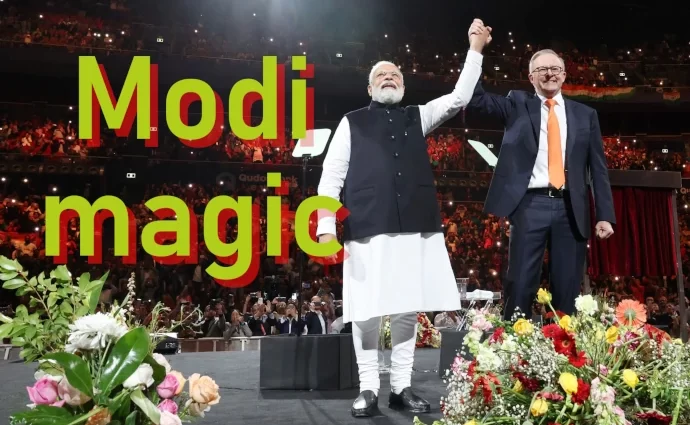The Indian PM Narendra Modi not surprisingly, got a rock star welcome at Sydney Olympic Park on Tuesday night where more than twenty thousand people from the Indian diaspora had gathered to catch a glimpse of their favourite leader.
PM Modi in turn praised Indian-born Australians for acting as India’s ‘soft power ambassadors’, helping to build mutual trust and respect between the two countries.
Speaking to a jampacked stadium, where thousands of fans and supporters chanted ‘Modi, Modi’, PM Modi highlighted the growing strength of cultural and economic ties between Australia and India, and the speed at which things were progressing.
The Australian Prime Minister Anthony Albanese, who celebrated the completion of first year in office as prime minister of Australia added that he was meeting PM Modi for the sixth time (in a single year).
Such is the pace of bilateral relations between Australia and India.
“Mutual trust and respect have not developed only due to the diplomatic relations of India-Australia,” PM Modi told his captive audience.
“The real reason, the real power is all of you Indians who live here in Australia.”
After years in the making, only last year Australia and India have signed a landmark trade liberalisation deal – the ECTA which has opened up markets to many businesses in both countries.
Both PMs Modi and Albanese got a rapturous and roaring reception arriving at the Qudos Bank Arena.
Speaking of the warmth of the welcome by the audience, PM Albanese said: “The last time I saw someone on this stage was Bruce Springsteen, and he did not get the welcome that Prime Minister Modi has got.
“Prime Minister Modi is the Boss.”
Modi and Albanese unveiled a plaque acknowledging Harris Park as “Little India” because of the many Indian Australians who live there and its array of Indian food stores.
Modi also met many Australians including Guy Sebastian (whose mother is from Kanpur in Uttar Pradesh India) business leaders billionaires Gina Rinehart and Andrew Forrest and leaders in education and research including – with Prof Salvatore Babones, Professor Toby Walsh, Dr. Brian Paul Schmidt, Mark Balla (known as ‘Toilet Warrior’), celebrity chef Sarah Todd and artist Danielle Mate.
Although cynics and PM Modi’s detractors label it as ‘stage-managed’ by Modi’s PR machinery (they always do), the reception for Modi at Olympic Park highlights the growing size and potential clout of the India diaspora in Australia.
Was it a surprise then when it came to canvassing for a “yes” vote for the Voice referendum later this year?
Not really.
Also read: Modi charms the Indian diaspora in Germany and Denmark
The 2021 census identified more than 670,000 people in Australia who were born in India. The Indian diaspora is forecast to number well over 1 million by 2035.
The event is being seen as a sequel to PM Modi’s previous (2014) visit to Sydney.
Coverage of the Modi in the local (mainstream) media has been mechanical, non-researched, akin to the work of those pseudo-intellectuals who get their legal references verified in the deepest recesses of the ‘WhatsApp’ and ‘Facebook’ universities.
How else would one describe this expression (question?) by none other than one of the two of Australia’s morning TV giants – David Koch (interviewing PM Albanese):
“He’s sort of reduced press freedoms, he discriminates against minorities, he’s accused of watering down democracy,” Koch asked. “He sort of, he seems a bit of a tyrant?”
Retorting rightly to such an ill-informed commentary, PM Albanese said it was “not up to me to pass a comment on some of the internal politics in India which, as a democracy, has a range of views, which is a good thing”.
“The economic growth that we’ve seen in India is extraordinary,” Albanese said, saying the nation had achieved remarkable progress since he travelled there as a backpacker in 1991.
“And Prime Minister Modi is certainly popular, not with everyone; it’s a democracy, but he’s popular with a majority of people.”
Most of the mainstream journalists in Australia would hang Modi for not publicly condemning Russia’s attack on Ukraine. They have no understanding of India’s foreign policy and no time to dig it up to understand why India has taken the position it has.
Not many of those paid attention to the fact that India has publicly expressed its support for Ukraine’s sovereignty. As recent as the G7 meeting in Japan, PM Modi met President Zelenskyy and confirmed India’s support for Ukraine’s sovereignty.
It is a pity that Australian journos, always ready to attack India on its position on Ukraine, either chose to ignore or did not do their due diligence homework before firing their questions.
India and the Australian Indian diaspora owes a debt of gratitude to Senator Penny Wong who valiantly pointed that out to educate Channel 9 journos and their viewers when she said:
“I would note that Prime Minister Modi met with President Zelenskyy (in Hiroshima for G7), and after that meeting President Zelenskyy welcomed India’s support for Ukraine’s sovereignty, which is the position Australia takes,” she told Channel 9.
The two nations carry a well-paced bilateral relations policy and are focusing on increased trade, education and defense ties among other things.
Australia and India have also signed a deal – the migration and mobility partnership arrangement which is designed to prevent people smuggling and promote mobility between the two countries of students, researchers and businesses.
The migration and mobility partnership arrangement, signed by Prime Ministers Anthony Albanese and Narendra Modi will “enhance cooperation” between the countries.
Similar Posts by The Author:
- To save the Labor party’s chances, it is imperative Anthony Albanese exits
- Has Justin Trudeau sunk India-Canada bilateral relations to the point of ‘beyond repair’?
- Fatima Payman’s ‘Australia’s Voice’ – Lessons from Kaushaliya Vaghela’s Vic Labor stint
- Haryana puts Rahul Gandhi back in the box
- Dr TJ Rao OAM, a legend will live on

